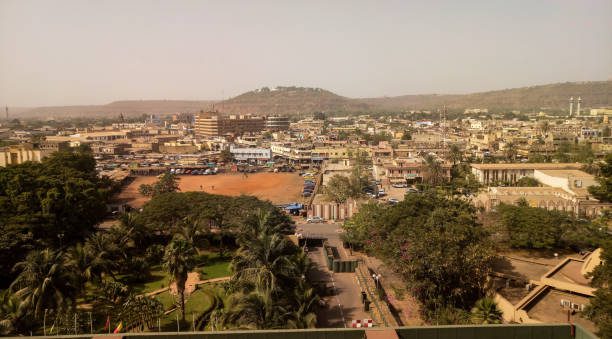In the early hours of Tuesday, September 17th, Mali’s capital, Bamako, endured a coordinated terrorist assault carried out by the Al-Qaeda-affiliated group Jama’at Nasr al-Islam wal Muslimin (JNIM). The attack, which unfolded around 5:30 am local time, specifically targeted the Faladié Gendarme School and a nearby military base located near the Modibo Keita Senou airport.
According to reports from the Associated Press (AP), citing a security official, both the gendarme school and the military installation became the focal points of the assailants’ aggression. By midday, the Malian military had regained control of the situation, and the army’s chief of staff, General Oumar Diarra, made a personal visit to the affected military camp. During his visit, Diarra called for national unity, stressing the need to resist divisive narratives.
“I’m telling the Malian people that this attack was done on purpose, and that we’re all Malians. We mustn’t let people pit us against each other, so we must avoid amalgams,”
General Diarra urged, referencing the potential dangers of internal fragmentation.
Diarra also appealed to the local population to support the ongoing efforts by providing any information that could aid the authorities in their investigation. He emphasized the importance of civilian cooperation in maintaining security and countering terrorism.
“I’m asking the population to provide information. I think their support has been very substantial, allowing us to pick up suspects here and there. The investigations are ongoing,”
he added.
In the aftermath of the attack, General Diarra confirmed that
“all the terrorists” who raided the school were “neutralized.”
Despite the successful neutralization of the attackers, the incident claimed the lives of both soldiers and students. According to a statement broadcasted by the national television network, ORTM 1, the loss of life was accompanied by significant material damage, though specifics were not immediately available.
An official, who requested anonymity when speaking to AP, corroborated the report, confirming the presence of “material damage” but refrained from offering additional details. The source also mentioned that at least 15 suspects had been apprehended in connection with the attack.
In a bold display, the JNIM group released a video purporting to show its fighters setting fire to an official plane and a pavilion near Bamako’s airport. The video adds to concerns over the increasing boldness of terrorist groups operating in Mali. The Malian army, however, reassured the public that it had conducted a thorough security sweep after fending off the attackers.
This marks the first significant attack on Bamako in several years. However, it comes at a time when terror groups are ramping up their activities, seemingly intent on intensifying the pressure on Mali’s military forces. The attack is also notable for its timing, just days before Mali’s Independence Day, set to take place on September 22nd, a time traditionally marked by national celebration.
The attack follows a history of insurgent violence in Mali. In 2022, gunmen targeted a military checkpoint situated approximately 60 kilometers outside of Bamako, resulting in the deaths of at least six individuals and injuries to several more. An even more deadly incident occurred in 2015 when an extremist group with ties to Al-Qaeda orchestrated an assault on a hotel in Bamako, leaving at least 20 people dead, including one American citizen.
The growing frequency of such incidents raises pressing questions about the effectiveness of security measures in Mali and the broader Sahel region. With terror groups exploiting the country’s political instability and security gaps, Mali remains on high alert. As the nation prepares to commemorate its Independence Day, authorities face the challenge of ensuring safety amidst mounting threats.
The ongoing investigation into the latest attack in Bamako underscores the complexities of combating insurgency in a region where extremist groups continue to operate with alarming impunity. The Malian government’s response will be closely watched in the coming days as the country seeks to recover from this latest act of terror while strengthening its resilience against future attacks.

















